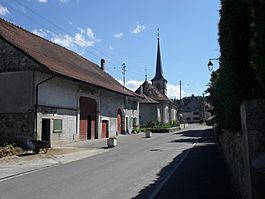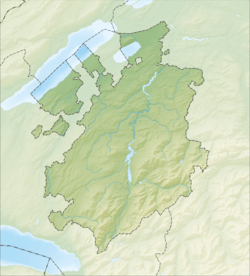Vuissens facts for kids
Quick facts for kids
Vuissens
|
||
|---|---|---|
 |
||
|
||
| Country | Switzerland | |
| Canton | Fribourg | |
| District | Broye | |
| Area | ||
| • Total | 5.62 km2 (2.17 sq mi) | |
| Elevation | 741 m (2,431 ft) | |
| Population
(Dec 2015)
|
||
| • Total | 245 | |
| • Density | 43.59/km2 (112.9/sq mi) | |
| Postal code |
1486
|
|
| Surrounded by | Champtauroz (VD), Chanéaz (VD), Combremont-le-Petit (VD), Correvon (VD), Démoret (VD), Denezy (VD), Thierrens (VD) | |
Vuissens was a small town, also known as a municipality, in Switzerland. It was located in the canton of Fribourg, within the Broye district.
On January 1, 2017, Vuissens joined with several other nearby towns. These included Bussy, Estavayer-le-Lac, Morens, Murist, Rueyres-les-Prés, and Vernay. Together, they formed a new, larger municipality called Estavayer.
Contents
Geography of Vuissens
Vuissens covered an area of about 5.6 square kilometers (2.2 square miles). A large part of this land, about 51%, was used for farming. This means farmers grew crops or raised animals there.
Another big part, about 36.4%, was covered by forests. The remaining 12.5% of the land was developed. This included buildings, roads, and other structures.
Most of the developed land was used for parks, green areas, and sports fields. This shows Vuissens had a lot of open space for its residents.
Vuissens' Coat of Arms
Every town in Switzerland has a special design called a coat of arms. It's like a symbol for the town. The coat of arms for Vuissens is described as Gules, a Chevron raguly Or.
This means it has a red (Gules) background. On top of the red is a golden (Or) V-shape. This V-shape is called a "chevron." The word "raguly" means the edges of the V-shape look rough or jagged, like a tree branch that has been cut.
Population and People
In 2015, Vuissens had a population of 245 people. Over the ten years from 2000 to 2010, the population grew by about 4%. More people moved into the town than moved away.
Most people in Vuissens speak French. In 2000, about 93% of the population spoke French as their main language. A smaller number of people spoke Albanian or German.
In 2008, the population was almost evenly split between males and females. About 52.3% were male and 47.7% were female. Most of the people living in Vuissens were Swiss citizens.
Many residents were born in Vuissens itself. Others were born in the same canton (Fribourg) or elsewhere in Switzerland. A small number of people were born outside of Switzerland.
The chart below shows how the population of Vuissens has changed over many years:

Important Sights
The entire village of Vuissens is considered a special historical place. It is part of the Inventory of Swiss Heritage Sites. This means it has important buildings and areas that are protected because of their history and beauty.
Economy and Jobs
In 2010, the unemployment rate in Vuissens was low, at 2.1%. This means most people who wanted to work had jobs.
Jobs in Vuissens were divided into three main types:
- Primary sector: This includes jobs related to nature, like farming. In 2008, 22 people worked in agriculture.
- Secondary sector: This includes jobs that make things, like construction or factories. Only 2 people worked in this sector.
- Tertiary sector: This includes jobs that provide services, like shops, restaurants, or offices. 28 people worked in this sector.
Many people who lived in Vuissens traveled to other towns for work. In 2000, 54 residents commuted out of the municipality. Most people used a private car to get to work.
Religion in Vuissens
Based on information from 2000, most people in Vuissens were Roman Catholic. About 63.7% of the population belonged to the Roman Catholic Church.
Another group, about 20.5%, belonged to the Swiss Reformed Church. A small number of people were Islamic or belonged to other Christian churches. Some people did not belong to any church.
Education System
In Switzerland, education is very important. The school system in the Canton of Fribourg, where Vuissens is located, works like this:
- Kindergarten: One year of optional kindergarten.
- Primary School: Six years of primary school, which is required for all children.
- Lower Secondary School: Three years of required secondary school. Students are grouped based on their abilities.
- Upper Secondary School: After lower secondary, students can choose to go to an optional upper secondary school for three or four years. This can be a gymnasium (which prepares them for university) or a vocational program (which teaches job skills).
- Higher Education: After upper secondary, students can go to a university or continue their apprenticeship for a specific trade.
In 2010-2011, no students attended school directly in Vuissens. Instead, 28 students from Vuissens went to schools in nearby towns. For example, 14 students went to primary school in a neighboring municipality.
 | George Robert Carruthers |
 | Patricia Bath |
 | Jan Ernst Matzeliger |
 | Alexander Miles |




